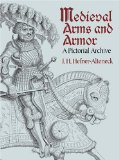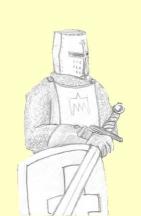The word "Knight" is something that comes from the old Anglo-Saxon word "cniht" which means to be a household servant or retainer. Across much of Europe they all had different names for knights and most of these were inextricably tied to the fact that a knight rode into battle on a horse.
Here are some of these other names for knights:
Ritter: This is German and it means "Rider", as on a horse
Chevalier - France, means horseman
Caballero - Spain
Knight errant - Errant means to wander or adventure and a knight errant is a knight who is roaming the countryside in search of adventures to prove himself.
 Medieval Arms and Armor: A Pictorial Archive (Dover Pictorial Archive)
Medieval Arms and Armor: A Pictorial Archive (Dover Pictorial Archive)
This handsome archive depicts richly detailed armor and weaponry dating from the early ninth century to the mid-1700s. Adapted from decorative ornamentation on burial monuments and manuscripts, hundreds of finely executed images depict authentic shields, swords, crossbows, helmets, and ornate suits of body armor for knights and their steeds. 100 black-and-white plates.

Knights: In History and Legend
The most comprehensive book on knights and knighthood available.
The word "knight" conjures up images of gallant men in gleaming armor astride noble steeds, searching for foes to fight and fair maidens to rescue. In Knights the reality of knighthood is detailed, warts and all. This handsome reference tells the true story of these mounted warriors, who evolved from simple soldiers on horseback to defenders of the faith during the Crusades.

I have lots of interesting articles about knights, their weapons and their organizations right here: Articles about Knights





